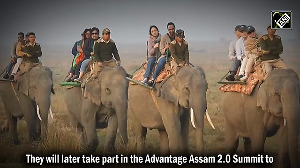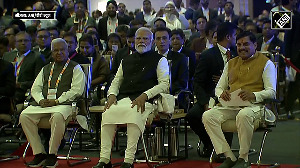Last week when Justice Rana Bhagwandas, acting chief justice of the Pakistan supreme court, crossed into India along with his brother judge, Justice Khalil-ur-Rehman Ramdev, on a private visit, he expected his trip to go unnoticed.
"How did you find out our whereabouts?" he asked Senior Associate Editor Onkar Singh when Onkar caught up with the two judges at the Punjab Bhavan in Chandigarh.
Justice Bhagwandas is the senior-most judge in the Pakistan supreme court after the present chief justice. According to Pakistan's constitution, the senior-most judge holds charge for the chief justice in the latter's absence.
Justice Bhagwandas, who was born in Sind, confesses he is not much of a cricket buff but applauds whenever Pakistan registers a win against India.
How has been your experience so far during your India visit?
I have come on a private visit with my brother judge Khalil-ur-Rehman Ramdev. I came to India once before, in 2005.
Any difference between the two visits?
I do not think it would be proper to compare the two visits because when I was here last time I did not visit Punjab and Haryana. Last time I went to Delhi, Lucknow, Gurgaon and Indore. This is a leisure trip full of recreation and excitement.
How has been the experience so far?
It is a nice experience, impressive and appealing. Because there is a lot of love and affection amongst the people who we met during this visit right from the moment we walked across the Wagah checkpost.
There is sincerity of purpose, respect for each other combined with love and affection. That is a great thing. It has been a wonderful experience.
You are the first acting chief justice of Pakistan from a minority community. How does it feel?
For me it makes me no difference because I treat it (his position) as a sacred trust. It is the virtue of God, the Parmatma, the creator to do justice and we as judges merely act as his agents. I always seek guidance from the creator so that we do not make a wrong judgment.
We act without favour or fear, ill will or affection. For me it makes no difference.
Before me there have been distinguished judges from the minority community who have held this esteemed post. We had Justice A R Cornelius, who was the chief justice of Pakistan for eight long years, from 1960 to 1968.
Our constitution commands that in the event of the absence of the chief justice or his inability to perform his functions the president shall appoint the senior-most judge to act as the acting chief justice. That is why I get an opportunity whenever our chief justice goes abroad.
What is the status of minorities in Pakistan? Do they get justice?
There is no problem. The law is equal for everyone. It provides for equal treatment and equal protection.
Do you have stringent laws to deal with crime like rape?
Pakistan has already enacted such laws. The question is only of the implementation of that law. If proper and definitive evidence comes on record then people who indulge in such heinous crimes are duly punished. But if there is inadequate evidence then the courts cannot convict them.
We have stringent laws to deal with terrorism and laws that deal with other heinous crimes under the Pakistan Penal Code.
Are you as a judge concerned about the honour killings in Pakistan?
Not just a judge but every Pakistani is deeply concerned that there should be no honour killings. A person cannot be allowed to take the law into his hands and commit a murder of a sister or a wife or a sister-in-law on the ground that she is living an immoral life or is suspected to have illicit relations with someone else.
Every Pakistani citizen is concerned about it. The law does not recognise the so-called honour killings. The Pakistani supreme court does not approve of such heinous crimes. We have modified the law and the offender is given capital punishment for the murder of a woman to protect the honour of a family or community. The supreme court is not sympathetic on this account.
Have you intervened in such matters on your own?
Yes, many times. And whenever we have done so it has given us a tremendous sense of satisfaction.
Rashid Junior, then captain of the Pakistan hockey team, once told us an airhostess refused to give him water when the team lost to India.
(Laughs) This must be a rare incident and the airhostess may have been worked up. I have little interest in cricket. People are crazy about cricket and we feel happy when our country wins. The names of Hanif Mohammad, Imran Khan, Shoaib Akhtar all come to my mind once I think about cricket. These are legends of Pakistani cricket.
Sachin Tendulkar is a big name in Indian cricket and he is one of the finest batsmen the world has ever produced. When Sehwag scored 309 during his last tour to Pakistan, his innings was highlighted by the media. I never have had the occasion of meeting them because we as judges have to be isolated.
Do you encourage Public Interest Litigation?
In Pakistan we have imposed heavy penalties on persons filing frivolous litigation in the name of Public Interest. But that does not mean what we do not entertain PILs. They are part of the judicial system. If some person pro bono publico takes up the cause of the general public and if it is a genuine cause and if it involves violation of fundamental rights then the courts must act and they do act.
Do Pakistani courts also have a backlog of cases?
That is the part of the judicial system. There are two factors for that. One is the growing population and the second is loss of our values.
When we downgrade our standards, crimes do take place. A majority of the cases relate to property disputes. Unless we reform ourselves and create awareness amongst ourselves, respect truth and observe sanctity for the law, this backlog is not going to end.
On our part, we try our best to minimise litigation by disposing off frivolous litigation and imposing heavy costs. We also dismiss false cases summarily. We should raise the quality of our values and infrastructure of our judicial system and imposition of heavy costs at all levels to bring down the backlog.






 © 2025
© 2025